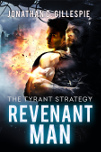Until the end of the world…
April 21, 2011 in Other Stuff
Longtime readers of my fiction might get the impression that I’m some kind of doom prophet concerning the state of the world now, and in the future. Nothing could be further from the truth.
I am not someone who sees the world as a dying man going through its final spasms. I don’t see mushroom clouds on the horizon. While it is true that a lot of my fiction takes place in nigh-dystopian future environments, really all I am doing is just acknowledging that the world as we know it never stays the world as we’d prefer it to remain for an endless length of time. Change is the norm.
I think that humanity has a natural desire to seek a form of mental normalization when it comes to regarding the present. We need to believe things won’t change. In essense, we like to know the layout of our lives from sunrise to sunset, and imagine that certain institutions will always be present.
In the United States, this desire for normalcy is coming back to bite us: a new, global world has been thrust upon us, and we are being forced to evaluate whether we want to face it, or cling to concepts and institutions that are rapidly becoming relics. There is wailing and nashing of teeth. You might hear that one of the big two parties is obstinate and the other is looking towards the future, but the truth is both are being dragged kicking and screaming towards the kind of reality that neither wants, where some of their most sacred cows are led to reduction or even slaughter: a post-Pax Americana time where we don’t have a military presence on every continent, when we can’t provide an umbrella for every conceivable need of the populace — a country that might not even be able to sustain interstate infrastructure, or feed all of its people.
It’s all coming full circle, you see.
War was first inter-tribal; a competition over hunting grounds or water sources. Then it became defined by glory, honor, and national pride. Step into the high middle ages, and war was fostered over trade routes, precious metals, slaves. Our last century saw the wars fought over abstract concepts like ideology. Each iteration of expansion and technology has made war between truly developed nations take place over higher concepts, culminating in what was really a period of tremendous peace between two nations — the Cold War — a template for a kind of non-conflict that might not exist for another eon.
Because now, we are returning to the yoke of our genetic forebears. We sit inside our nations and again find our desires retreating to more base concepts: how will I eat?
What conflicts will this hegemony drive?
I see the possibility of the collapse of nations, at least in the near term, and the rise of city-states again.
I like to take my fiction and imagine the world with one critical element suddenly cut out. In “Eee”, the oceans of Earth are basically rendered impassible by a mutagenic weapons-virus. “Paston, Kentucky”, ponders life without access to metal. One paradigm shift is all it takes to produce a short-term change in the human experience. It is interesting, and a little scary, to watch mankind take the first steps towards a future world that might see us without fossil fuels. Perhaps, as America comes down from the apex of its power following World War II, the world’s own addiction to the American consumer might prompt a similar shift.
Sound nuts, vesting all this importance into the U.S.? What about China, India, or Russia, you ask? To which I reply that there was nothing the Romans were doing that their far-flung neighbors really weren’t, but knock out a hyperpower and watch how interconnected economies of even pre-industrial societies react. Ask the Germans what happens when a powerful nation takes a nose-dive due to a failure at adapting to a changing world. In the course of human history, few events served so mighty a catalyst as the German state going insolvent after World War I.
I’ll see you in the pages of history.
Stay tuned.

Recent Discussion